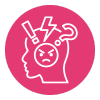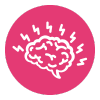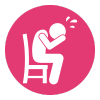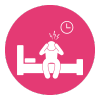Mental health and addiction
Mental health and addiction are often found together, each coaxing the other. Sadly, mental health conditions don’t just trigger addiction, they fuel it too with the resulting substance use putting further strain on mental health. Fortunately, undergoing rehab treatment at a professional addiction treatment centre like Banbury Lodge can provide the necessary help and support to overcome addiction with major benefits for co-occurring mental health issues.
Olaf Nixon, Addiction Therapist at Banbury Lodge
PGDip, Dip Hyp CS, MNCPS (Acc.), MBACP
When asked ‘How does Banbury Lodge approach individuals who have mental health issues alongside their addiction?’
‘Everyone will have something that goes alongside their addiction. There’s always a reason why the addiction has become the most prevalent element, and it’s the exploration of where that trauma initially lies for that individual.’
Learn more about Olaf here.
What is the link between mental health and addiction?
Addiction and mental health issues often form a vicious cycle, with addiction worsening mental health symptoms and vice versa. Dual diagnosis is a term used to describe the co-occurrence of mental health and addiction disorders. For example, individuals with anxiety or depression may use drugs or alcohol to alleviate their symptoms, leading to addiction. On the other hand, addiction can cause or worsen mental health disorders, such as anxiety, depression, or schizophrenia. Simultaneous mental health and substance abuse disorders can complicate matters for sufferers, as they require specialised care to address both conditions simultaneously.
Which co-occurring mental health and addiction disorders are most common?
There are many co-occurring mental health conditions which are more common in those with addiction than in the general population. These include:
Anxiety Disorder and Addiction
Anxiety often leads to substance use as a coping mechanism. Rehab focuses on managing anxiety through therapy, mindfulness, and emotional regulation to reduce reliance on drugs or alcohol.
ADHD and
Addiction
Impulsivity and poor attention in ADHD increase addiction risks. Treatment combines therapy, medication, and behavioural interventions to address ADHD symptoms and addictive behaviours.
Bipolar and
Addiction
Bipolar episodes can lead to substance misuse to manage mood swings. Dual diagnosis treatment addresses mood stabilization and addiction recovery simultaneously.
BPD and Addiction
Emotional instability in BPD often triggers substance use. Rehab focuses on dialectical behavioural therapy (DBT) to manage emotions and break the addiction cycle. Click to learn more.
Codependency and Addiction
Co-dependency fuels enabling behaviour’s, worsening addiction. Therapy helps individuals build healthy boundaries, self-esteem, and independence in relationships.
Depression and Addiction
Depression often drives substance abuse as self-medication. Treatment combines antidepressants, therapy, and lifestyle changes to heal both conditions for recovery.
Schizophrenia and Addiction
Schizophrenia increases addiction risks due to self-medication. Dual diagnosis care includes antipsychotics, therapy, and addiction recovery to improve quality of life.
Anger Management and Addiction
Poor anger control can lead to addiction as an outlet. Rehab teaches coping strategies, emotional regulation, and healthier ways to process anger.
Autism and Addiction
Sensory challenges or social struggles in autism may lead to addiction. Treatment provides tailored therapy, addressing addiction while respecting neurodiverse needs
OCD and Addiction
Obsessions or compulsions may drive substance use as relief. Therapy focuses on exposure response prevention (ERP) and addiction recovery tools to manage both conditions.
PTSD and Addiction
PTSD often leads to addiction as a way to numb trauma. Trauma-focused therapy and addiction treatment work together to address both underlying issues and dependency. Click to learn more
Personality Disorders and Addiction
Addiction and personality disorders often co-occur. Treatment combines therapy and coping strategies to address impulsivity, emotional regulation, and substance use.
Self-Harm and Addiction
Self-harm and addiction share underlying emotional struggles. Therapy focuses on identifying triggers, managing distress, and creating healthier coping mechanisms.
Stress and Addiction
Chronic stress can lead to substance use for relief. Rehab focuses on stress management techniques like mindfulness, therapy, and healthy lifestyle changes to prevent relapse.
Suicide and Addiction
Addiction increases suicide risks due to hopelessness and emotional pain. Treatment provides crisis support, therapy, and relapse prevention to improve mental health.
Grief and Addiction
Grief often drives substance use to escape pain. Rehab helps individuals process loss through therapy, emotional support, and addiction recovery strategies.
Insomnia and Addiction
Insomnia can lead to dependency on drugs or alcohol for sleep. Rehab includes therapy, sleep hygiene education, and addressing underlying addiction to restore healthy sleep patterns.
How are addiction and mental health disorders treated?
When it comes to treating addiction with the presence of mental health conditions, it is crucial to ensure that the rigorous nature of addiction treatment doesn’t worsen the co-occurring conditions.
In the first instance, any underlying mental health conditions must be stable before you start rehab. This means getting appropriate prescription mental health medication from your doctor which Banbury Lodge will ensure you receive during your stay.
After that, the great news is that many addiction therapies also have huge benefits for mental health and can help you manage symptoms and improve your overall well-being.
Some of the most effective rehab therapies at Banbury Lodge include:
- Cognitive-behavioural therapy: CBT can help you identify negative thought patterns and behaviours that lead to/are caused by mental health and addictions. CBT focuses on teaching you how to replace these negative thoughts and behaviours with positive ones. By doing so, you can develop healthier coping mechanisms, reduce the risk of relapse and also gain greater control over your mental health.
- Dialectical behaviour therapy: DBT combines cognitive-behavioural therapy with mindfulness and acceptance techniques to help individuals manage their emotions. It was actually developed to treat bipolar disorder and so is particularly effective for individuals who struggle with intense emotional experiences. By learning how to manage your emotions through DBT, you can become less reactive, learn to cope in difficult moments without needing drugs or alcohol and increase your chances of successful recovery.
- Group therapy: Group therapy will provide you with a supportive community of peers who are also in recovery. This can help you feel less isolated during your stay in treatment and enable you to build relationships which is particularly important if you have mental health issues like anxiety. Additionally, group therapy can help you learn from other’s experiences and develop healthy coping mechanisms.
- Motivational interviewing: This therapy will help you identify your motivations for change and overcome any ambivalence towards addiction and mental health treatment. Motivational interviewing is particularly effective for individuals whose mental health conditions make them nervous or unsure about seeking help.
- Holistic therapies: In addition to traditional addiction therapies, holistic therapies can also be beneficial in treating addiction with the presence of mental health conditions. Holistic therapies aim to treat the whole person, including their physical, emotional and spiritual well-being. Examples of holistic therapies include yoga, meditation, art and sound therapy, all of which can help you manage your symptoms and improve your overall quality of life.
- Family therapy: Issues with mental health and addictions can have a significant impact on family dynamics, leading to strained relationships and conflict. Family therapy can help improve communication, address underlying issues, and provide a supportive environment for individuals in recovery. Additionally, family therapy can help family members learn how to provide support while setting healthy boundaries.
How to help a loved one with addiction and mental health conditions
Helping a loved one with mental health and addiction conditions can be a challenging and emotional experience. It is essential to approach the situation with empathy and an understanding of the complex issues they are facing. Here are some practical tips on how to support a loved one with addiction and mental health conditions:
Educate yourself
Learn as much as you can about mental health and substance abuse. Understanding the signs and symptoms can help you recognise when your loved one needs help and give you the right strategies for supporting them during the addiction recovery process.
Encourage treatment
Encourage your loved one to seek professional help and offer to assist in finding a suitable addiction treatment centre. Be patient and understanding, as it can take time for someone to be ready for treatment.
Practise self-care
Supporting a loved one with mental health and substance abuse disorders can be stressful and require all your patience and energy. It is, therefore, essential to prioritise your own self-care needs to give yourself the energy and motivation you need to keep going. This can include everything from exercise and meditation to just spending time with friends and family when things get tough.
Set boundaries
While it’s important to provide support, it’s also crucial to set boundaries to avoid enabling addictive behaviours. This may include not giving them money, not making excuses for them and always setting clear expectations for their behaviour.
Offer emotional support
Listening without judgement and offering emotional support can help your loved one feel heard and understood. Encourage them to talk about their feelings and be there for them during difficult times when your presence can provide the reassurance and motivation they need to keep going.
It’s important to remember that supporting a loved one who has issues with their mental health and addiction can be a long and challenging journey. However, by providing support, empathy, and encouragement, you can make a positive difference in their recovery journey.
How to get help for mental health and addiction issues
If you or a loved one is struggling with addiction and mental health issues, seeking professional help is crucial. At Banbury Lodge, have helped many people successfully overcome addiction while at the same time, creating a far more positive outlook for their underlying mental health conditions. Contact us today to find out more about how our team of experienced addiction therapists and medical professionals will work with you to build a brighter future.
Frequently asked questions
























